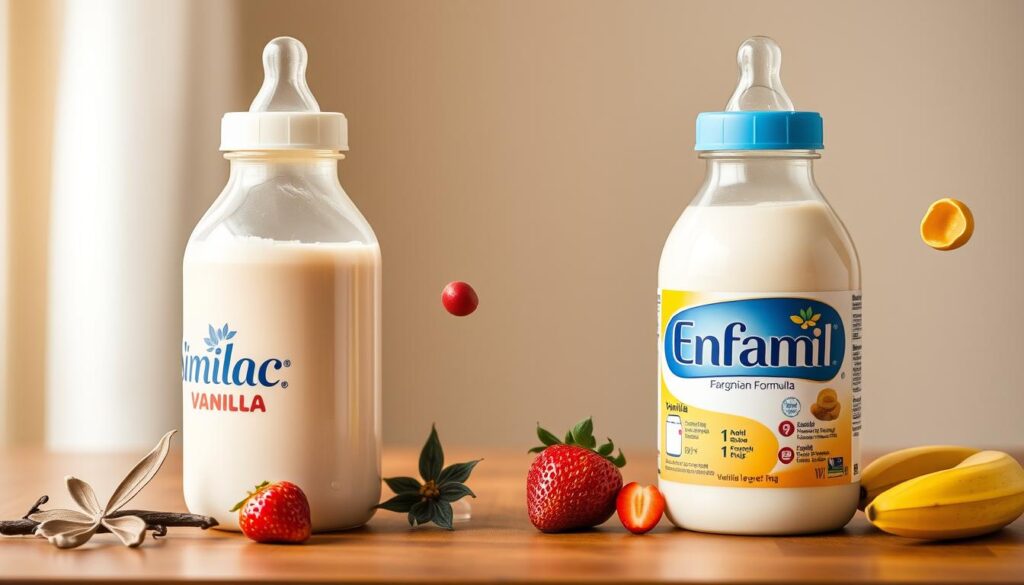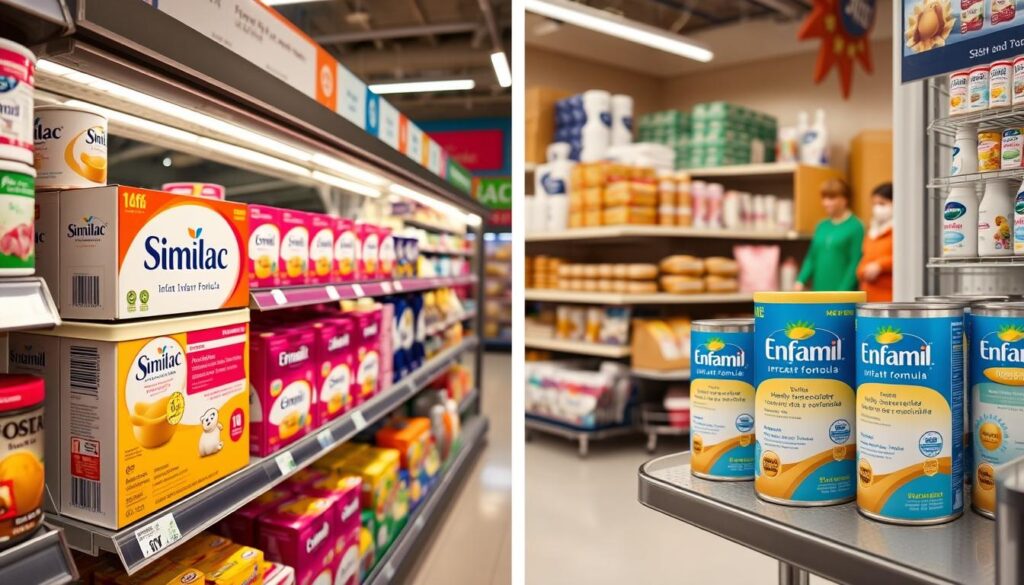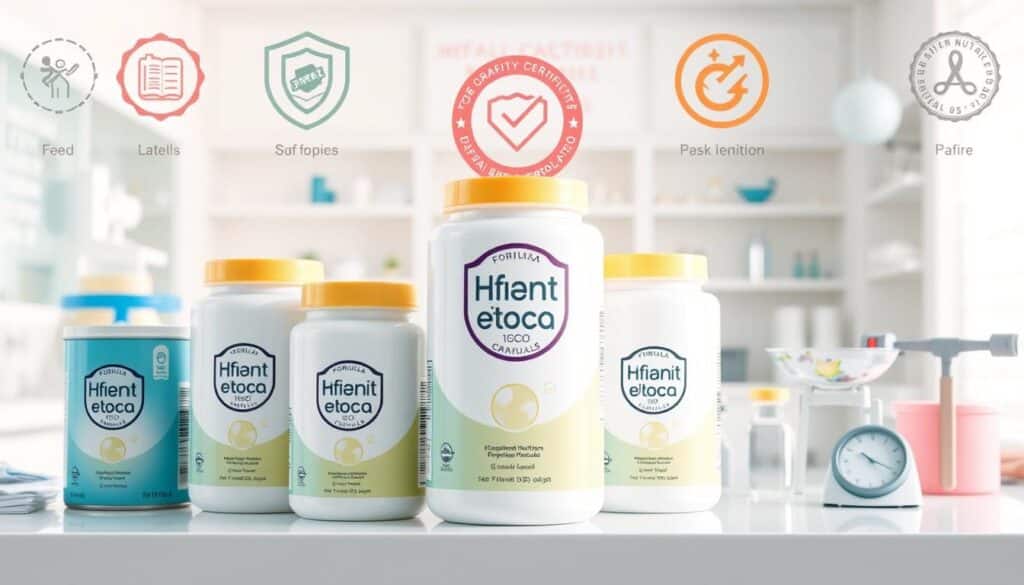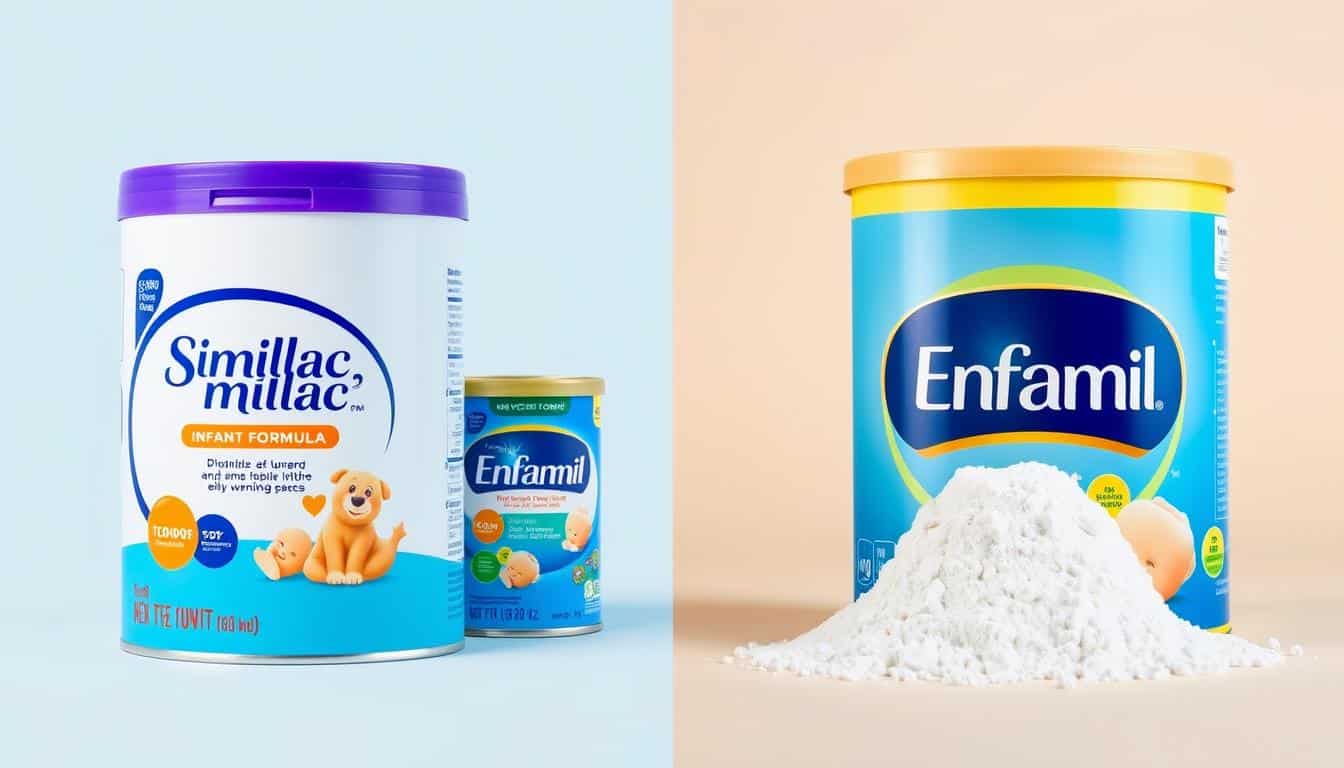As new parents, we’ve all stood in the baby aisle, staring at rows of infant formula brands. We feel overwhelmed by the choices. Finding the perfect nutrition for our little ones is exciting and nerve-wracking.
Similac and Enfamil are two top infant formula brands. They promise optimal nutrition for your baby’s growth and development.
Choosing between Similac and Enfamil is not random. It’s about understanding the differences that affect your baby’s nutrition and health. Our guide will help you understand what makes these brands different.
Every baby is unique. What works for one might not work for another. We’ll look at the details of Similac and Enfamil, including their ingredients and specialized formulas.
Key Takeaways
- Similac and Enfamil are leading infant formula brands in the United States
- Each brand offers unique nutritional profiles and specialized formulations
- Ingredient composition varies between the two brands
- Parents should consider individual baby needs when selecting a formula
- Consulting with pediatricians is crucial in making the right choice
Introduction to Infant Formula Options
For new parents, the world of baby formula can seem overwhelming. It’s important to know the differences in baby formulas to ensure your infant gets the best nutrition. Our guide will help you understand the various types of infant formulas and make a smart choice between Similac and Enfamil.
Choosing the right infant formula is key for your baby’s growth and health. Every baby is different, and the right formula can greatly impact their well-being.
Understanding Baby Formula Types
There are several main types of infant formulas, each designed for different needs:
- Cow’s Milk-Based Formulas: The most common, made to mimic breast milk
- Soy-Based Formulas: Great for babies with lactose intolerance or milk protein allergies
- Specialized Formulas: For babies with specific health conditions or dietary needs
The Importance of Choosing the Right Formula
“Not all formulas are created equal. The right choice can support your baby’s growth, immune system, and overall development.” – Pediatric Nutrition Expert
When deciding between Similac and Enfamil, consider these important factors:
- Nutritional content
- Your baby’s digestive needs
- Possible allergies or sensitivities
- Advice from healthcare professionals
We aim to give parents the knowledge to choose the best nutrition for their babies. Remember, every baby is unique.
Ingredient Comparisons of Similac and Enfamil
Choosing the right infant formula is a big decision. Parents must understand the different ingredients. They compare cow’s milk and soy formulas to find the best for their baby.
Parents should look at three key things: proteins, carbs, and fats. These are important for a baby’s growth and health.
Protein Sources: Whey vs. Casein
Infant formulas have different proteins. There are two main types:
- Whey protein: Easier to digest and more like breast milk
- Casein protein: Gives slow, steady nutrition
Carbohydrates: Types and Sources
Carbs give babies the energy they need. Similac and Enfamil use:
- Lactose (the main milk sugar)
- Corn syrup solids
- Prebiotics for better digestion
Fats: Omega Fatty Acids and Their Sources
Fats are key for brain growth. Both Similac and Enfamil have omega-3 and omega-6 fatty acids. They come from:
- Vegetable oils
- DHA (docosahexaenoic acid)
- ARA (arachidonic acid)
“Not all formulas are created equal. Understanding ingredient differences can help parents make informed nutrition choices.” – Pediatric Nutritionist
Parents should talk to doctors before choosing between cow’s milk and soy formula. Every baby is different.
Nutritional Profiles: A Closer Look
It’s important for parents to know the nutritional values of infant formulas. Both Similac and Enfamil have profiles that help babies grow well.
Essential Vitamins in Infant Formulas
The nutritional values in formulas are key for baby growth. We found big differences in vitamins and minerals:
- Vitamin D for bone health
- Iron for brain development
- Calcium for strong bones
- DHA for cognitive support
Detailed Nutritional Breakdown
| Nutrient | Similac | Enfamil |
|---|---|---|
| Vitamin A | 500 IU | 525 IU |
| Vitamin D | 400 IU | 400 IU |
| Iron | 12 mg | 12 mg |
Age-Specific Formulations
As babies grow, their nutritional needs change. Each developmental stage requires unique nutritional support. Similac and Enfamil make formulas for different stages.
“Proper nutrition is the foundation of healthy infant development” – American Academy of Pediatrics
Parents should talk to pediatricians to find the right formula for their baby.
Flavor and Taste Considerations
Choosing the right baby formula is more than just looking at nutrients. The taste and flavor are key to a baby’s liking and feeding experience. Parents often find that taste is a big factor in their baby’s food happiness.

Parents looking at baby formula differences notice different things. They talk about:
- Subtle variations in sweetness levels
- Differences in powder consistency
- Potential impact on infant’s drinking preferences
Parent Reviews and Formula Preferences
Our research shows parents have different tastes based on their baby’s likes. Some babies clearly prefer one, while others like both.
| Taste Factor | Similac | Enfamil |
|---|---|---|
| Sweetness Level | Moderate | Slightly Less Sweet |
| Mixing Ease | Smooth | Quick Dissolving |
| Infant Acceptance | High | High |
How Taste Affects Baby’s Acceptance
Taste sensitivity varies among infants. What one baby likes, another might not. Nutrition experts suggest introducing flavors slowly and watching how your baby reacts.
“Every baby is unique. Their taste preferences can significantly influence feeding satisfaction.” – Dr. Emily Rodriguez, Pediatric Nutrition Specialist
Knowing about these differences helps parents choose the best formula for their baby’s taste and needs.
Pricing Analysis: Similac vs. Enfamil
Finding the right formula can be tough for new parents. We’ve looked into the costs of two top brands: Similac and Enfamil.
Looking for affordable formula options? It’s not just about the price. Costs change based on packaging, how much you buy, and the type of formula.
Average Prices and Packaging Options
Here are some key points about formula prices:
- Powder formulas are usually cheaper than ready-to-feed ones
- Buying in bulk can lower the cost per ounce
- Online stores often have better prices
| Formula Type | Similac Price Range | Enfamil Price Range |
|---|---|---|
| Powder (12.4 oz) | $22 – $28 | $21 – $27 |
| Ready-to-Feed (32 oz) | $8 – $12 per bottle | $7 – $11 per bottle |
| Concentrated Liquid | $5 – $9 per container | $5 – $8 per container |
Cost-Effectiveness for Families
Choosing a formula is about finding a balance between quality and cost. Formula prices are just one thing to think about when picking out food for your baby.
“The cheapest option isn’t always the best for your baby’s nutritional needs.” – Pediatric Nutrition Expert
When picking a formula, look at the total cost for a month. Think about what your baby needs and any discounts or subscription deals from the makers.
Availability and Accessibility
Finding the right infant formula brands can be tough for parents. Similac and Enfamil have made it easier. They have wide distribution to help parents find their products.

- Major retail pharmacies
- Supermarket chains
- Online marketplaces
- Specialty baby stores
Where to Purchase Similac and Enfamil
Choosing where to buy infant formula is important. We’ve looked at all the options:
| Retail Channel | Similac Availability | Enfamil Availability |
|---|---|---|
| CVS Pharmacy | Excellent | Excellent |
| Walgreens | Very Good | Very Good |
| Target | Comprehensive | Comprehensive |
| Walmart | Wide Selection | Wide Selection |
Online vs. In-Store Availability
Shopping online for infant formula has its perks. You can:
- Buy anytime
- Find more products
- Save money
- Get it delivered to your door
“Convenience and reliability are key when selecting infant formula brands for your baby’s nutrition.”
Tip: Always check the product’s authenticity and expiration date, whether online or in-store.
Formula Types: Specialized Options
Choosing the right infant formula can be tough for parents. They need to understand the different options to meet their baby’s needs.
Parents have many choices between organic and traditional formulas. Each is made for specific nutritional needs. These formulas help babies with unique health issues.
Similac’s Specialized Formulas
Similac has a wide range of formulas for different needs:
- Similac Pro-Sensitive: For babies with mild lactose sensitivity
- Similac Alimentum: Hypoallergenic for infants with protein allergies
- Similac Pure Bliss Organic: Organic, non-GMO ingredients
- Similac PM 60/40: For premature infants
Enfamil’s Specialized Formulas
Enfamil also offers a range of specialized formulas:
- Enfamil Gentlease: For babies with sensitive stomachs
- Enfamil NeuroPro Sensitive: For babies with sensitive stomachs
- Enfamil Organic: Certified organic, essential nutrients
- Enfamil A.R.: For infants with reflux
“Selecting the right formula is about understanding your baby’s unique nutritional needs.” – Pediatric Nutrition Expert
When choosing between organic and traditional formulas, consider several things. Look at the ingredients, nutritional value, and your baby’s health needs. Always talk to a pediatrician to find the best formula for your baby.
Recommendations from Pediatricians
Choosing the right infant formula can be tough for new parents. Pediatric experts offer great advice to help families pick the best baby food.
General Guidelines for Choosing Formula
Pediatricians give some important tips for picking infant formula:
- Always talk to your child’s doctor before changing formulas
- Think about your baby’s nutritional needs and any allergies
- Choose formulas that meet FDA standards
“The best formula is the one that keeps your baby healthy and thriving,” says Dr. Rachel Martinez, pediatric nutrition specialist.
Specific Situations Requiring Special Attention
Some babies need special formulas because of health issues:
- Premature infants: Need more calories and nutrients
- Babies with milk protein allergies: Need hypoallergenic formulas
- Infants with digestive issues: May do better with special formulas
When deciding between Similac and Enfamil, pediatricians suggest looking at your baby’s needs. Each formula brand has its own nutritional benefits for different babies.
Digestibility: How Babies React
Digestive health is key in infant nutrition, and choosing the right baby formula is important. Parents worry about formula allergies and how brands support their baby’s sensitive stomach. Knowing how Similac and Enfamil help with digestion can guide families in making the best choice.
Every baby’s stomach is different, making it hard to find the perfect formula. Both Similac and Enfamil have special formulas to help with common digestive issues.
Similac’s Digestive Support Approach
Similac uses several ways to help with digestion:
- Gentle protein blends that mimic breast milk
- Reduced lactose options for sensitive stomachs
- Prebiotics to support healthy gut bacteria
Enfamil’s Digestive Formulations
Enfamil tackles digestive problems and allergies with:
- Specialized enzyme-modified proteins
- Unique carbohydrate combinations
- Probiotics designed for infant gut health
“Choosing the right formula can significantly impact your baby’s digestive comfort and overall nutrition.” – Pediatric Nutrition Expert
Parents should talk to their pediatrician to find the best formula for their baby. Individual reactions to formula can vary, so getting personalized advice is crucial.
Safety Standards and Regulations

Keeping infant formula safe is key for makers and watchdogs. Parents count on strict checks to keep their babies healthy and well-fed.
FDA Guidelines for Infant Formula Production
The U.S. Food and Drug Administration (FDA) sets strict rules for making infant formula. These rules cover everything from what goes into the formula to how it’s packaged and shipped.
- Mandatory nutrient requirements
- Strict manufacturing protocols
- Regular safety inspections
- Comprehensive ingredient testing
Quality Assurance in Top Infant Formula Brands
Big names like Similac and Enfamil go beyond the law to ensure their formula is safe. Their dedication to safety means parents can trust what they’re feeding their babies.
| Quality Assurance Aspect | Similac | Enfamil |
|---|---|---|
| Ingredient Traceability | Comprehensive tracking | Advanced sourcing verification |
| Contamination Testing | Multiple checkpoint screening | Continuous quality monitoring |
| Nutritional Consistency | Precise nutrient balance | Standardized formulation |
“Protecting infant health through rigorous safety standards is our highest priority.” – Infant Nutrition Association
Parents can trust that top brands are serious about safety. This gives them peace of mind as their babies grow.
Allergies and Sensitivities
Finding the right formula for your baby can be tough, thanks to allergies. Knowing which ingredients to avoid is key. This helps pick the best formula for your baby’s needs.
Common Allergens in Baby Formula
Some baby formulas have ingredients that can cause allergic reactions. The main culprits are:
- Cow’s milk protein
- Soy protein
- Lactose
- Corn-based ingredients
Options for Sensitive Tummies
Similac and Enfamil have special formulas for sensitive babies. Always talk to a pediatrician to find the best one for your baby.
| Formula Type | Allergen-Free Features | Best For |
|---|---|---|
| Hypoallergenic Formula | Extensively hydrolyzed proteins | Babies with milk protein allergies |
| Lactose-Free Formula | Alternative carbohydrate sources | Infants with lactose intolerance |
| Soy-Based Formula | Plant-based protein | Babies with milk protein sensitivity |
Watch for signs like digestive discomfort, skin rashes, or respiratory issues in your baby. A detailed medical check-up can pinpoint the allergen. Then, it can suggest the best formula.
“Every baby is unique, and finding the right formula may require some patience and professional guidance.” – Pediatric Nutrition Experts
Transitioning Between Formulas
Switching baby formulas can be tough for parents. It’s important to watch your baby closely and understand their needs.
Knowing when to switch formulas is key for your baby’s health. They might need a new formula for reasons like digestive issues or allergies.
Signs Your Baby Needs a New Formula
- Persistent digestive discomfort
- Frequent spit-up or excessive gas
- Skin rashes or allergic reactions
- Poor weight gain
- Continuous fussiness during feeding
Tips for Smooth Transitions
- Consult your pediatrician before making any changes
- Introduce new formula gradually
- Mix new and old formulas in increasing proportions
- Monitor your baby’s reactions closely
| Transition Method | Recommended Ratio | Duration |
|---|---|---|
| Gradual Mixing | 25% new formula / 75% old formula | 2-3 days |
| Incremental Change | 50% new formula / 50% old formula | 2-3 days |
| Final Transition | 100% new formula | Remaining days |
Remember, each baby is unique. What works for one might not work for another when exploring baby formula differences.
“Patience and careful observation are key when transitioning your baby’s formula.” – Pediatric Nutrition Experts
Conclusion: Making an Informed Choice
Exploring the difference between Similac and Enfamil shows both brands have special nutritional solutions for babies. Each formula is made to help babies grow and develop. Parents should think about their baby’s needs, like what ingredients are in the formula and how well it’s digested.
Recap of Key Differences
Similac and Enfamil differ in protein sources, vitamins, and special formulas. Some babies do better with Similac’s milk protein, while others like Enfamil’s balanced nutrients. These differences show how important it is to find the right formula for each baby.
Encouragement to Consult Health Professionals
We suggest working with pediatricians to pick the right formula for your baby. Only a doctor can fully explain the difference between Similac and Enfamil based on your baby’s health. They can give advice based on your baby’s nutritional needs, allergies, and growth stage.
The best formula is one that helps your baby grow well, gives all the nutrients they need, and is easy for them to digest. Always listen to your pediatrician and watch how your baby reacts to different formulas.

